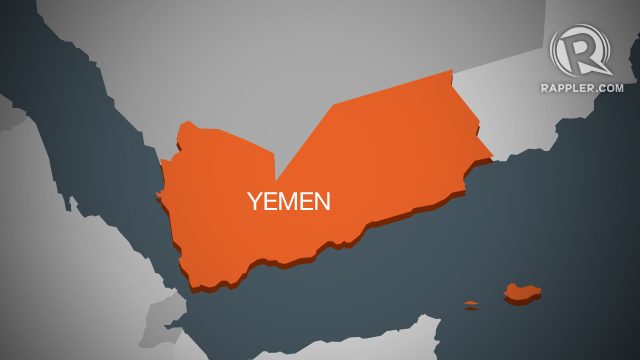SUMMARY
This is AI generated summarization, which may have errors. For context, always refer to the full article.

ADEN, Yemen (3rd UPDATE) – Yemen’s president on Saturday, October 29, rejected a UN peace proposal for his war-battered country, as air strikes by his Saudi-led coalition allies killed at least 47 rebels, inmates, and civilians.
Forces loyal to President Abedrabbo Mansour Hadi’s government have been locked since 2014 in deadly battles with Iran-backed Shiite Huthi rebels who overran the capital Sanaa late that year.
The conflict escalated in March 2015 when Saudi Arabia launched a military campaign to push back the rebels.
The war has left nearly 7,000 people dead, mostly civilians, according to the United Nations which had been struggling to convince the warring parties to implement a ceasefire and revive a stalled political process.
The latest peace proposal submitted by UN envoy Ismail Ould Cheikh Ahmed was rejected by Hadi who even refused to receive it as he met the mediator in Riyadh.
While the government has shifted its temporary headquarters to second-city Aden, Hadi resides in Riyadh with most senior officials.
The contents of the roadmap which the envoy already presented to the rebels on Tuesday have not been made public.
But informed sources say it calls for agreement on naming a new vice president after the rebels withdraw from Sanaa and other cities and hand over heavy weapons to a third party.
Hadi would then transfer power to the vice president who would appoint a new prime minister to form a government in which the north and south of Yemen would have equal representation.
‘Door to more suffering’
A statement on the government’s sabanew.net quoted Hadi as saying the roadmap “only opens a door towards more suffering and war and is not a map for peace”.
It cited Hadi as saying the plan “rewards the putschists while punishing the Yemeni people and legitimacy”.
It was unclear how Hadi’s Arab backers would react to his refusal, especially after a key coalition member, the United Arab Emirates, hailed the proposal on Thursday as a “political solution for the Yemeni crisis”.
Saudi Arabia has not commented on the UN envoy’s latest proposal and the rebels have yet to respond.
Warring parties in Yemen are under mounting international pressure to end the conflict that has left the already-impoverished country grappling with increasing cases of malnutrition and a spread of disease.
The coalition, for its part, is under pressure over for the high civilian death toll from its bombing campaign.
On Saturday, four air strikes hit three residential buildings killing 17 people and wounding seven others in the battleground town of Salo, southeast of third-city Taez, according to rebel-controlled media.
A local Yemeni official loyal to the government said the coalition air strikes had hit three adjacent homes by mistake.
“All those in the houses were killed,” he told AFP, adding that a child and seven women were among the dead.
Hours later, fresh air strikes on a rebel-held security building in Yemen’s west killed at least 30 prisoners and insurgents, military officials said.
The two air strikes destroyed the building in Zaidia, north of the port city of Hodeidah.
The building houses a prison holding more than 40 inmates, most of them opponents of the Huthi rebels controlling the area, a military source close to the insurgents told AFP.
A number of rebels inside the building at the time were also killed in the attack, the source added.
Residents confirmed the attacks and medics gave the same toll without being able to immediately give a number for the wounded.
It was not yet clear why the coalition targeted the building holding anti-rebel inmates.
There was no immediate comment from the coalition on both attacks.
Central bank bombing foiled
Further south in second city Aden, the temporary seat of government, guards on Saturday thwarted a suicide attack on the central bank, opening fire on the bomber’s vehicle and blowing it up before it reached the building, a security official said.
The bank has been based in Aden since Hadi last month ordered its relocation from Sanaa, accusing the rebels of running down Yemen’s foreign reserves.
Five guards were wounded when the bomber’s vehicle blew up around 30 meters (yards) from the bank building, the security official told AFP.
The bank’s relocation has been a major blow to the rebels, forcing them to halt salary payments to state employees in the large areas of the country they control.
A UN report released in August found that the rebels and their allies were diverting about $100 million a month from the central bank, and that its foreign reserves had dwindled to $1.3 billion from about $4 billion in November 2014. – Rappler.com
Add a comment
How does this make you feel?
There are no comments yet. Add your comment to start the conversation.